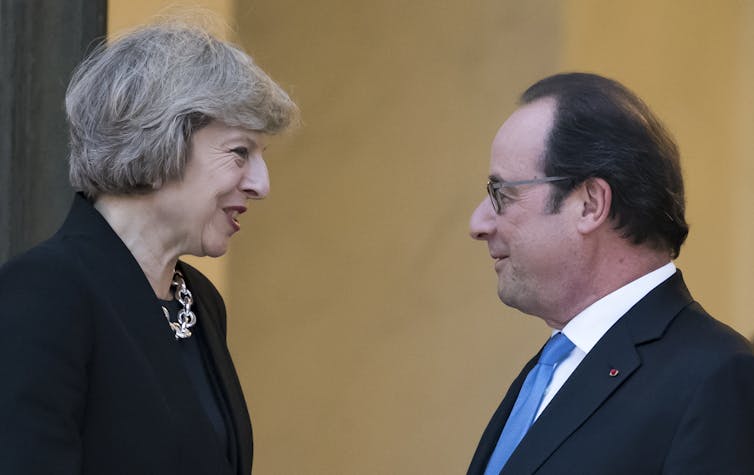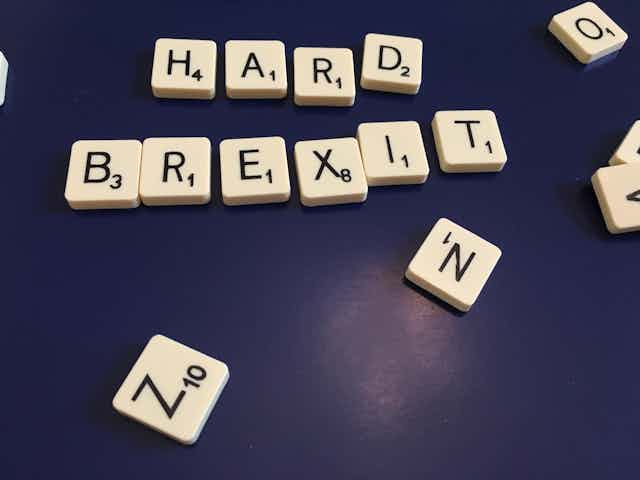Britain’s decision to exit the EU has brought with it an ubiquitous lexicon of new terms. But closer examination reveals that their novelty is deceptive. As a country seeks to tackle a deeply complex issue, it is falling back on simplistic, populist language and imagery, which is preventing the kind of agile, creative thinking urgently required to get us out of the mess we’re in.
It all begins with the ugly but hashtag-friendly portmanteau word itself, Brexit. It initially sounded unusual and vaguely corporate, like the name of a new brand of painkiller, or a UK business specialising in IT. Now it is everywhere, and impossible to dissociate from tension and turmoil. It has spawned a series of further neologisms: Brexiters, Brexiteers, Bremoaners.
Then, clarifying adjectives started to be applied to the original term – most notably “soft” and “hard” Brexit. Arriving to meet her EU counterparts in Brussels, Theresa May, introduced a new variety – the “smooth” Brexit. Angela Merkel’s response suggested she immediately understood the binary pattern: “It is going to be rough going, I think”.
Soft, hard, smooth, rough. It sounds as if we’re in smutty joke territory, or descending into the murky psychosexual underbelly of political posturing, the verbal counterpart of May’s kitten heels or thigh-high patent leather boots.
Reading reports of the build-up to EU negotiations, the unsavoury Brexit foreplay, can be like dipping into a pulp erotic novel. Here’s François Hollande’s response to May’s tough-talking at the Summit: “I said very firmly: Theresa May wants a hard Brexit? The negotiation will be hard.”
It isn’t difficult to envisage a whole range of new clarifying adjectives being adopted. The right-wing press yearn for a quick Brexit, a “snap” Brexit, or (political S&M alert) a “short, sharp” Brexit. Would it take much to imagine a rich or poor Brexit? A happy or sad one? A wet or dry one?

But aside from sado-masochistic posturing, the familiar language of Brexit – its Brexicon, if you will – reveals one of the most distinctive and disturbing qualities of this entire saga. The fact is, the debate has been unable to move beyond the simplistic “yes/no” level at which it started. If this continues, it’s likely to lead to disastrous consequences. We live now in a simplistic Gulliver’s Travels world of Bremoaners versus Brexiteers. Except that this is not satire, but real.
Pleasure in pain
It’s no accident that “hard Brexit” is the most used phrase, and not simply because this denotes the type of exit favoured by the most vociferous leavers. What is presumably meant by “hard Brexit” is a “clean break”. A hard Brexit means a decisive, irreversible shift, the UK breaking off from Europe like snapping a stick of seaside rock.
This outcome is deemed preferable to the “soft” equivalent – a messy tearing-off, as with a piece of toffee or nougat. The ideal of a hard departure is that nothing would be left behind, barely any evidence of shared history, nothing but a clean, broken edge, a reminder to the rest of the continent that Britain acted decisively, and left it behind.
It’s a fantasy, of course, and one which taps into prevailing right-wing thinking about the value of hardness, of difficulty. This is hard as in: not messy or weak but tough. Don’t mess with hard Britain.
The idea of hard-nosed, right-leaning politicians – straight-talking, authoritative, unafraid to make tough decisions or to tell it like it is – in sneering opposition to soft, bleeding heart counterparts on the left is longstanding in British politics. And the implication is that, yes, this is going to be hard – on the devious migrants, the free-loading, non-contributing EU expats, the lily-livered, soft-bellied, wimpy liberals, the Bremoaners. It may even be hard on everyone, but it’s necessary. The faintly S&M dimensions of Brexit-talk may be explained by this corrective impulse.
In wider society, it is relatively uncommon for someone to insist on the value of anything “hard” – apart from perhaps teachers and personal trainers. In everyday speech, too, “hard” tends to denote something negative or unwelcome. Hard-hearted. Hard of hearing. Hard skin. Hard stools.
The impoverished language may draw on the hard/soft imagery of the right wing, but the unwillingness or inability of political leaders across the spectrum to elevate the debate above the basic level is blocking progress to a workable solution. It impedes productive discussion of a vital, complex issue.
The discourse of the EU Summit shows clearly that insisting on a “hard” or a “smooth” Brexit as a starting position in any negotiation is going to get us nowhere, for it traps responses in its simplistic, binaristic logic. This immovable discursive position is indeed something unpleasant clogging up the body politic.
What is required is a dose of laxative, so the nation can expel this unproductive element and the system can start to function once more. Ironically, what is needed are pro-remain politicians and leaders to continue with the hard-hitting counter-argument which has begun to flow in recent weeks. It’s complex and nuanced and that’s just what is needed.
A hard rain is falling on Europe, but sustaining a rich counter-debate is the best hope of softening its impact.

